
Pelé, who many regard as the greatest player of all time, died in hospital in Sao Paulo on Thursday.
He had been undergoing treatment for colon cancer since 2021.
UNESCO tweeted that it was “deeply saddened” at his passing, and extended condolences to the Brazilian people, and the wider “football family”.
The UN agency said that he had “worked relentlessly to promote sport as a tool for peace. He will be greatly missed.”
Similarly, in a tweet, the head of UN refugee agency, UNHCR, Filippo Grandi, wrote, “We are all with the people of Brazil”.
“We are celebrating a man who made millions of kids dream across continents, and generations.”
As a 17-year-old, Pelé won his first football or soccer World Cup, in 1958, going on to lift the top trophy in the game a further two times, in 1962 and 1970.
He scored a world record 1,281 goals, playing in 1,363 games during his professional career, which began when he was just 15.
Born Edson Arantes do Nascimento, in 1940, the football giant, nicknamed, “the Black Pearl”, and “the King”, retired from the game in 1977.
In 1999, the Santos player and Brazil’s most venerated star, was voted player of the century in a poll of previous Ballon d’Or winners – the players who win the annual global football award for being the outstanding performers that year.
He devoted considerable time in retirement to supporting the UN and its work, both as a Goodwill Ambassador for the UN Children’s Fund, and as a UNESCO Champion for Sport, from 1994.
NAN




